

"Orphan Ideas" by Luigi Zingales. Exit from comment view mode.
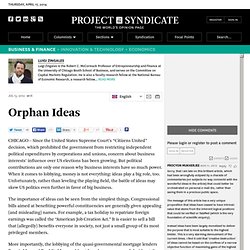
Click to hide this space CHICAGO – Since the United States Supreme Court’s “Citizens United” decision, which prohibited the government from restricting independent political expenditures by corporations and unions, concern about business interests’ influence over US elections has been growing. But political contributions are only one reason why business interests have so much power. When it comes to lobbying, money is not everything: ideas play a big role, too. Unfortunately, rather than leveling the playing field, the battle of ideas may skew US politics even further in favor of big business. The importance of ideas can be seen from the simplest things.
The US Deleveraging Has Resumed. Last quarter, upon the release of the Q4 2011 Z.1 (Flow of Funds) report, we penned "The US Deleveraging Is Now Over", because, well, it was: all the categories tracked by the Fed's Credit Market Debt Outstanding series posted a sequential increase over Q3.
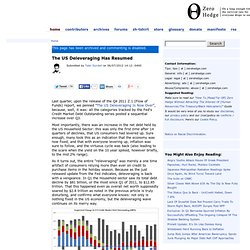
Forecasting. Doesnt. Work. Game theory? Occupy Economics?: A Report Back from the Nerdiest Protest I’ve ever been to. « Ph.D. Octopus. By Peter I just got back from Chicago, where, along with attending the American Historical Association, I participated in a series of protests held by Occupy Chicago, along with CACHE (Coalition Against Corporatization of Higher Education) that targeted the American Economics Association (AEA).
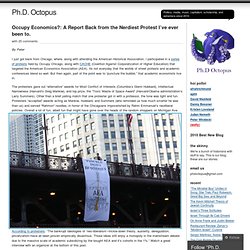
MF’s Missing Money Makes You Wonder About Goldman: Jonathan Weil. Six months ago the accounting firm PricewaterhouseCoopers LLP said MF Global Holdings Ltd. and its units “maintained, in all material respects, effective internal control over financial reporting as of March 31, 2011.”
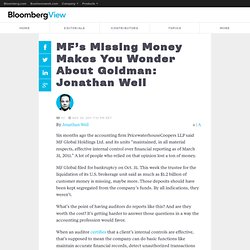
Do Investors Stifle Innovation? (Part II) : Planet Money. Istvan Bara/Getty Images Note: This is the second of two related posts.

In his latest New York Times Magazine column, Adam Davidson writes, "from a C.E.O.'s perspective, long-term R. and D. is a lousy investment...the C.E.O. of DuPont who retired three years ago, told me that it's tough to get investors to think more than two years ahead — at most.'" To continue the discussion, we asked two economists on different sides of the debate - Baruch Lev of New York University and Shivaram Rajgopal of Emory University - to answer the following question: Are investors pressuring CEO's to cancel long-term R&D projects?
Shivaram Rajgopal's response is below. I think Adam Davidson is unfortunately correct in suggesting that CEOs of public companies feel pressure from short-term shareholders to cut R&D budgets. Debates: Inflation: Statements. Is Any CEO Worth $189,000 Per Hour? The Destruction of Economic Facts. During the second half of the 19th century, the world's biggest economies endured a series of brutal recessions.
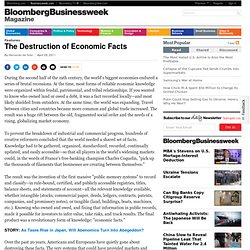
At the time, most forms of reliable economic knowledge were organized within feudal, patrimonial, and tribal relationships. If you wanted to know who owned land or owed a debt, it was a fact recorded locally—and most likely shielded from outsiders. At the same time, the world was expanding. Travel between cities and countries became more common and global trade increased. The result was a huge rift between the old, fragmented social order and the needs of a rising, globalizing market economy. To prevent the breakdown of industrial and commercial progress, hundreds of creative reformers concluded that the world needed a shared set of facts.
Over the past 20 years, Americans and Europeans have quietly gone about destroying these facts. Rational Irrationality: Inside George Soros’s “Monstrous Monkey House” Snow-capped peaks; nightcaps with Larry Summers; discussions of complexity theory over breakfast; Tennyson quotations from Gordon Brown at lunch.
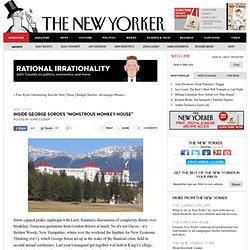
No it’s not Davos—it’s Bretton Woods, New Hampshire, where over the weekend the Institute for New Economic Thinking (INET), which George Soros set up in the wake of the financial crisis, held its second annual conference. Amar Bhidé: In Defense of Human Judgment. In a recent highly publicized game of Jeopardy, two of the game’s greatest past champions were beat by Watson, an IBM computer whose intelligence was based on algorithms.
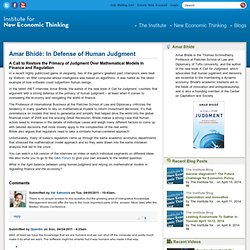
How Our Economy Was Overrun by Monsters and What to Do About It - Umair Haque. How Inferior American Education Caused The Credit/Real Estate/Sovereign Debt Bubbles and Why It's Preventing True Recovery. Cgasmediatvdrama.blogspot.comThis is a lengthy, highly provovative article illustrating in explicit detail my thoughts on how America's inferior education system made the Great Recession not only a foregone conclusion of indoctrinated GroupThink, but prevents a true recovery from recovery due to the abject fear of price clearing.

You may need to put your thinking caps on and exercise some patience and restraint with this one. I am going to follow it up with an explcit example of said groupthink by going against the conventional grain (yet again) and pointing out what many in the mainstream consider to be the most likely threat to economic prosperity in 2012 (and no, Iran is not even in the running on this one).